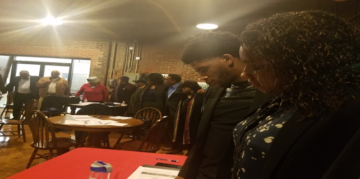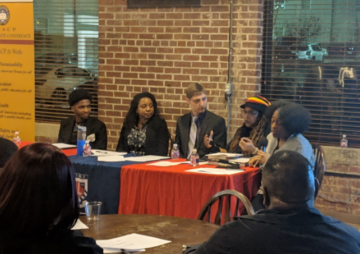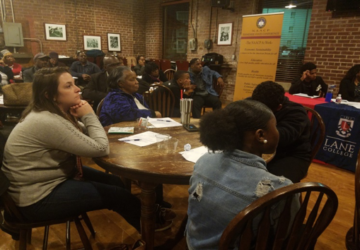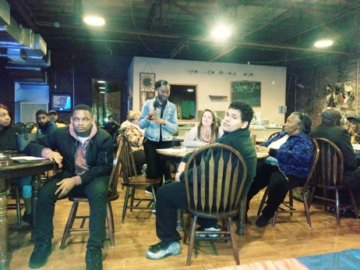This blog was written by Sandra Upchurch, former Energy Justice Manager at the Southern Alliance for Clean Energy. SACE's Sandra Upchurch reports back from the 15th Annual NAACP-TN Race Relation/Advocacy Summit in Jackson, TN, where young leaders are developing their consciousness of environmental and climate justice.
Guest Blog | March 21, 2019 | Energy Justice, TennesseeTN-NAACP College and Youth Division is “Preparing for Climate Change”

On March 1st The TN-NAACP College and Youth Division opened up for the 15th Annual Race Relation/Advocacy Summit in Jackson, TN by hosting a Youth & Community Town Hall meeting. As the co-chair of the Environmental Climate and Justice (ECJ) committee for TN NAACP State Conference, I was honored to participate this year in the advocacy planning for the College and Youth’s Division’s Town Hall Meeting.
The aim of this year’s town hall meeting was to raise awareness about environmentalism/climate change. The Summit annually brings together advocates and representatives from major corporations, public and private agencies, community-based organizations to rekindle the discussion and further explore the strategies identified at the original 2004 Summit. Over the years, the Summit topics have ranged from discussion to relative to education, health, economics, criminal justice, and voter education. This year, the focus areas include a discussion on Climate Justice, Education Equity, and Criminal Justice. The theme of the 2019 Summit was Uniting Against Racism: “Strategies for Addressing Injustice in Criminal Justice and Equity in Education.”
Communities of color are often the hardest hit by climate change.
What often comes to mind with the mention of climate change are melting ice caps and suffering polar bears. Historically, American society has failed to connect the dots around the direct environmental injustice impacts of climate change on own our lives, our families, and communities, all of whom depend on the physical environment and its bounty.
The NAACP believes strongly that in order to address these inequities, future leaders must be developed today, and such development is ongoing in the Youth & College Division, created in 1936. The NAACP has one of the largest organized groups of young people of any secular organization in the country.
Learning the Lingo
The two-day Summit began on Friday evening with the Youth Town Hall Meeting at Lane College. The first activity was for the group as an ice breaker to bring people in contact with each other, to join arms, shoulder to shoulder, to pray, to signify unity, and to remind us that together, can we solve the problems of climate change and environmental justice.
In order to maximize workshop participant engagement and ensure comprehension of environmental justice and climate change terms for the workshop attendees and students, Daphne Nelson, Manager of the TN NAACP State Conference, and Professor Ameera V. Graves, Lane College Historian, introduced the panelists and placed attendees into groups working at tables, where they were tasked with using their cell phones to look up terms such as:
-
-
- Pollution (including examples of pollution that you observe in your neighborhood and day to day experiences)
- Environmental Racism & Environmental Justice

- Climate Change & Global Warming
- Fossil Fuels & Greenhouse Gases
- Carbon Emissions & Carbon Footprint
- Energy/Electricity Production
- Energy Burden
- Clean and renewable energy & and its 3 types
- Equity & The New Green Deal
-
This vocabulary activity was followed by a panelist discussion, in which I spoke on Energy Burden, and highlighted a recent study shows that Memphis, Atlanta, and Birmingham suffer the highest energy burden in the U.S. This means people living in these cities spend a higher percentage of their income on their power bills. I talked about the contributors to this burden, which include fees like fixed fees and grid access charges, which customers cannot control. I was proud to be joined by several other expert speakers, including:

-
-
-
- Chinelo Tyler, Just Student Energy Organizer for the Partnership for Southern Equity, who described his role in galvanizing young leaders to educate and engage low-income, communities of color about the sourcing and commodification of power generation in Georgia.
- Chandra Farley, Just Energy Director for the Partnership for Southern Equity, who develops local and regional strategies to advance energy equity through coalition building, leadership development and community engagement around the equity impacts of the sourcing and commodification of power generation in the American South. While unfamiliar to many residents, those policies significantly impact household income stability and impinge on the overall quality of air, water, and other natural resources that affect our health and well-being.
- Ameera Graves, NAACP Youth & College Advisor, challenged the panelists who were also tasked with answering a list of questions regarding the NAACP’s Environmental and Climate Justice Program Goals.
 Donald Addu, who founded the first Citizens Climate Lobby (CCL) chapter in North Carolina 8 years ago and is currently the Southeast Director managing over 60 active chapters spanning the Carolinas, Virginia, West Virginia, Tennessee, Kentucky, Georgia, Florida, and Alabama. Donald’s primary focus is grassroots organizing along with direct Congressional lobbying on the federal level. The primary goal of CCL is to get a bi-partisan bill passed by Congress that will enact the Carbon Fee and Dividend Works law, an act that aims to reduce fossil fuel consumption through three measures:
Donald Addu, who founded the first Citizens Climate Lobby (CCL) chapter in North Carolina 8 years ago and is currently the Southeast Director managing over 60 active chapters spanning the Carolinas, Virginia, West Virginia, Tennessee, Kentucky, Georgia, Florida, and Alabama. Donald’s primary focus is grassroots organizing along with direct Congressional lobbying on the federal level. The primary goal of CCL is to get a bi-partisan bill passed by Congress that will enact the Carbon Fee and Dividend Works law, an act that aims to reduce fossil fuel consumption through three measures:
-
-
-
-
-
-
-
-
- Placing a steadily rising fee on fossil fuels.
- Giving 100% of the fees minus administrative costs back to households each month.
- Using a border adjustment to stop business relocation.
-
-
-
-
-

Workshop participants reported out on assigned key terms and listening intently to the video of Chandra Farley’ Testimony (starting at minute 25) before the House Committee on Natural Resources’ Subcommittee on Energy and Mineral Resources on February 12 about energy equity throughout the South.
The Tennessee Conference of the National Association for the Advancement of Colored People, (TN-NAACP or Tennessee State Conference of NAACP, is the Nation’s Oldest and Largest Civil and Human Rights Organization. The TN NAACP Race Relations/Advocacy Summit was initiated to take a close look at the progress of race relations in every aspect of life across Tennessee.

Prof. Graves concluded, “As the advisor of the Lane College chapter of the NAACP, I feel an unwavering responsibility to teach students the mission of the NAACP. Our mission implores us to advocate for equity, not only, in the criminal justice, education, and political systems of our country, but also in the environmental arena. Environmental and Climate Justice is actually one of the six primary areas of focus established as a part of our national NAACP platform. In part, this is because racism leads to the contamination of the water we drink, the air we breathe, the soil in which our food is grown, and the dumping of toxic waste in our neighborhoods.
“The link between discriminatory practices and policy and living conditions harming our people is a connection of which most of our people are not aware. This is why the forum at Lane was a must. We have to fill the climate change information void. Our students and all of our members have to understand the environmental threats to our lives that loom, and we have to fulfill our obligation to be true to the NAACP mission.”
I concur with Professor Graves that we must fulfill our obligations to the NAACP’s mission and that we must lobby for more weatherization, renewable energy, green jobs, and voice our ECJ concerns at the local, state and national levels of government. If you are interested and want to make an impact check out the ECJ’s Youth and College Tool Kit.
In closing out the workshop, President Gloria Sweet-Love tasked the Youth and College Division to lobby for climate justice and invited the panelists to do another ECJ workshop next fall at the state conference. She reiterated what she said in her 2019 Martin Luther King video: “The challenge of equity must be primary on our agenda. Equity cannot be achieved accidentally. Actions leading to it must be intentional. Our nation and our nation’s children will continue to benefit as greater equity is realized!”